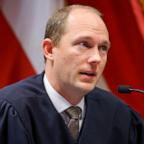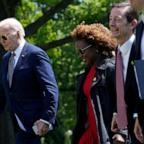Excerpt: Journalist Tells Story of Missing Twin
Sept. 26, 2006— -- To say Kim Powers endured a traumatic upbringing is an understatement.
His mother committed suicide when he was a child. His father and fraternal twin suffered from alcoholism. Both Powers and his twin, Tim, had to deal with coming out as gay men. And at the age of 28, Tim mysteriously disappeared.
In his haunting memoir, Powers, an Emmy-award winning journalist, recounts his search for his twin brother. With the suspense of a mystery, "The History of Swimming" is a memoir like no other.
BOOK ONE
FRIDAY
CHAPTER ONE
My twin brother Tim wrote these paragraphs the night he had a nervous breakdown, seven years ago, our senior year at the same college. He had stayed up all night finishing a paper on Richard Henry Dana's novel Two Years Before the Mast, about a boy who goes off to sea, and this was a sort of preface to his paper:
"The History of Swimming"
My older brother taught me to swim when I was five years old. Edwin, who was nicknamed "Porky" by my father, led my twin brother Kim and me to the water one Sunday morning near Easter. He promised we would not drown if we did what he said.
Porky held his arm across the water's edge and told us to fall over it until we felt the water. I stared at the pool until my twin leapt over Porky's arm and into the water. Kim turned back around to me, smiled, and I followed. We shared an adventure in space.
In adolescence, I forgot how to swim, but spent a great deal of time yearning for the water. At Boy Scout Camp, I panicked when a water safety instructor told me to run to the water's edge, strip, and save a pretend drowning victim. I am still amazed by the speed at which the water becomes a razor's edge.
With this story, I go swimming every night for a new adventure in space. I am surprised that time and memory have taught me to swim again.
I've read and re-read those paragraphs countless times over the years, but they've never seemed as foreboding as they do now. Tim writes, "With this story, I go swimming every night for a new adventure in space," but which "story" does he mean? The novel he had just finished reading -- Two Years Before the Mast? The anecdote he had just told, about being taught to swim by our older brother Porky? Or the paper itself, the one he had written for his "Literature of the Sea" class?
I keep thinking it's that, the actual paper, that holds the key to his breakdown. I read it once, years ago -- before I was looking for clues -- but it's disappeared since then. I doubt it even made it out of Tim's dorm room at graduation; I can imagine him leaving it there, hammering it into a wall like an angry edict from Martin Luther, a warning about the dangers of thinking too much about the past to the incoming freshman who would inherit the room and all its secrets.
Maybe Jim Gray, the English professor for whom it was written (a Vietnam vet who once told me the experience of war was like one long, unrelenting rock concert), still has a copy of it. Not filed neatly away, able to be retrieved at a moment's notice, but never completely out of mind, either. Just like me, Jim's always looking for that one clue in it that might unlock the mystery of Tim's breakdown; he's always thinking maybe he could have prevented it, had he only known. But known what? That's the real mystery.
In Two Year Before the Mast, a boy goes to sea to find himself. It's the basic plot of practically everything: somebody goes somewhere -- New York, Louisville, Africa, the moon, fill in the blank -- and discovers, for better or worse, wondrous, strange things about himself. What did Tim discover about himself, reading that book? And did he write about it, leave a map in those words, written seven years ago? "With this story, I go swimming every night for a new adventure in space. I am surprised that time and memory have taught me to swim again." I keep reading those sentences, but all I can see are separate words, nouns, no verbs, themselves swimming in my mind and refusing to do anything: night, adventure, space, time, memory, surprise. Little words, big ideas. Scary things. I keep thinking I'm just on the verge of understanding, but then the picture falls apart. The images don't form a logical story, even though I think I remember the separate images he conveys: being taught to swim by our older brother, the humiliation of Boy Scout Camp, the sadness of Easter (maybe that's just my memory).
Who knows?
Who knows (and who the f**k cares -- except me, right?) what Tim meant in that G*****n preface. It was written ages ago, long before either of us could have predicted what would happen in the years to come. So why do those few, mysterious paragraphs keep tumbling over and over in my head right now? Because they keep my mind off the thing at hand? Because they're so beautifully written? Because I think there might be hidden clues in them?
All of the above.
My twin brother Tim is missing, really missing this time, and I have no idea where he is. For the first time in my life, I think he might be dead. I don't know if I can live without him, even though I don't think I can live with him anymore, either.
**********
The first call came around noon today. Joyce, the secretary where Tim worked, called to see if I knew where he was, or rather, in her not-wanting-to-scare-me-but-beginning-to-get-pissed-off way, if I had "heard from him" this morning. He hadn't shown up, hadn't called in, couldn't be reached. Joyce sounded like she wanted to say more -- call me paranoid, but I'm an expert at hearing things that aren't there -- but knew this wasn't the time.
I tried to stay calm, and asked if this had happened before.
She said nothing, and in that silence, I knew it had.
I'd been expecting a call like this; I'd known something was going to happen, sooner rather than later. Tim was following a familiar pattern: any time he had to face a major change -- and he was supposed to move to a new apartment tomorrow, or rather, escape his old one, with me helping him -- he would disappear, usually on a drinking binge. There would be no apology or explanation when he resurfaced, only anger; usually directed at me, because he refused to direct it at himself.
Things had been too strange lately. Things had been too strange the last seven years. We had lived apart most of that time. I had migrated from college in Texas to New York, moved in with a lover, gone to grad school, gotten a coveted job, finding scripts and books for a semi-famous TV star to turn into movies. Tim had moved to Louisville, Kentucky, and social service, one of JFK's Volunteers in Service to America. He discovered drinking in Louisville, and long distance abuse toward me over the phone. Drunken calls late at night, telling me how I had failed him. How I had become a New York snob. How we had been cursed by our childhoods (that part probably true.)
But on occasion, there was also long-distance love over the phone, and through the mail. We'd blithely make long, rambling phone calls to each other in our lean and hungry post-college years, no clue how we'd pay for them, just certain there'd be some way once the bill came due. (The same way we'd gotten through life to that point -- no clue, no map, just a vague hope we'd find a way by the time we got there -- wherever "there" was. Let it be said the Powers twins coasted through life with a certain charm, but nothing a parent could call "real life skills.") We'd exchange magnificent letters, more from Tim than me; his crafted over long periods of time and written in different inks: this one from work, that one scrounged on a bus, another from home late at night. Letters that treated his drinking as a joke, a punchline. "I'm sitting here in a bar, writing this letter. No, don't worry, it's 8 a.m., but I've only had a few drinks."
But the drinking, or the cursed childhood, or the absence of a map, took control, and things in Louisville became more difficult for him, until everything "crashed and burned," his frequent description of things. He moved to New York, where I had already lived for several years, and we didn't have the soften-the-blow cushion of long distance anymore. Things got worse for him. He started losing small things: phone numbers, keys, Citibank cards. Then bigger things: jobs, apartments, boyfriends. Finally, he attempted suicide. I had gotten to the point where I literally stopped breathing whenever the phone rang, afraid of what might be on the other end of the line: Tim, the police, a hospital, the morgue.




